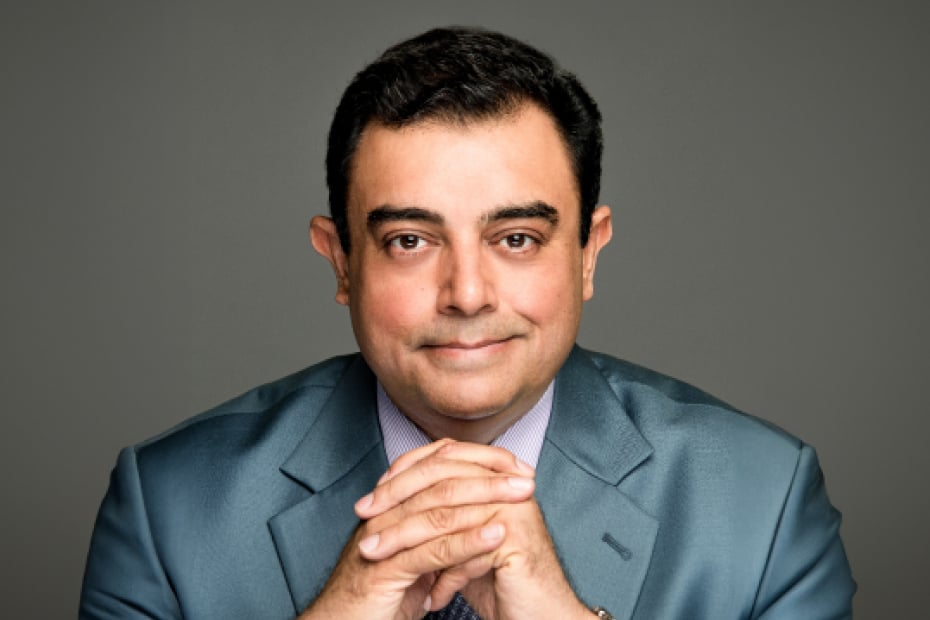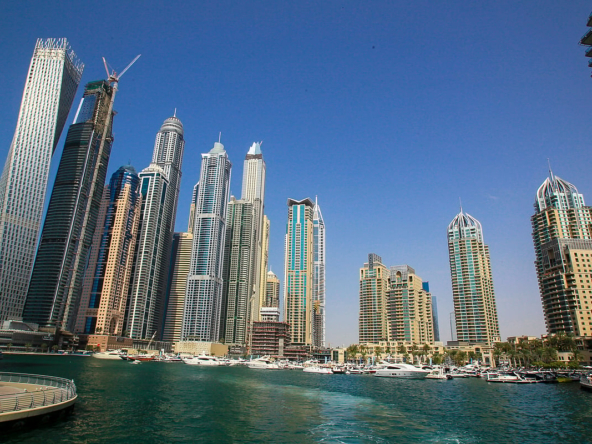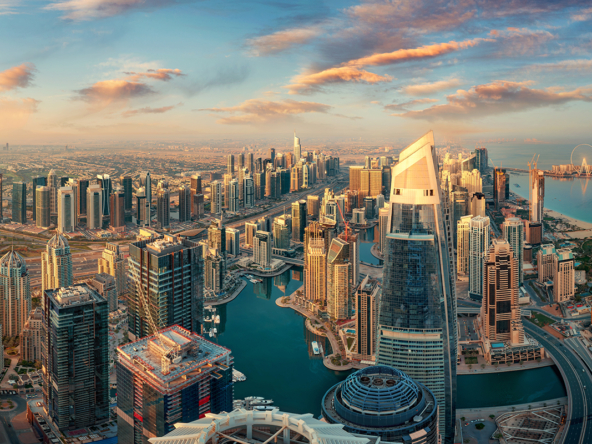In this interview, Imran Farooq explains why Dubai continues to attract global wealth amid geopolitical instability
Imran Farooq: Powering Samana Developers to the Top of Dubai’s Property Game
Imran Farooq has become a key player in Dubai’s rapidly growing real estate sector.
As the CEO of Samana Developers, he has led the company into the upper ranks of Dubai’s extremely competitive off-plan development space — so much so that its latest billboard proudly declares Samana as the “7th largest developer” in Dubai, a bold claim in a city where nearly every company positions itself at the top.
Under Farooq’s leadership, the company has achieved a staggering annual growth rate of 229 per cent over five years, launching a range of projects that span residential, retail, commercial, and even hospitality. Samana has also made its international debut, most notably with a Maldives development offering luxury villas in a five-star resort setting under a 99-year leasehold model.
In this exclusive feature, Farooq discusses what keeps global wealth flowing into Dubai amid worldwide uncertainty, why the off-plan sector remains in high demand, and why prime office spaces are seeing record interest. He also shares Samana’s upcoming mega-project — a master-planned community — and explains why having full control over construction is now a strategic necessity.
Farooq further opens up about the reasoning behind the “7th largest” ranking on their billboard, growing global investor interest, and how Samana is getting ready for Dubai’s ever-increasing property appetite.
How do you assess Dubai’s real estate market at present? Reports of stabilisation exist, but platforms like Property Finder and Bayut suggest momentum is still strong. What’s your perspective?
I think the momentum is phenomenal — there’s absolutely no doubt. Overall, Dubai is only getting more appealing. If you look at trends in Western countries, particularly the UK, aggressive tax measures are driving wealthy individuals away. The UK is currently experiencing the largest outflow of millionaires and billionaires, and Dubai is the main beneficiary. Around 63 or 64 per cent of British expats relocating now choose Dubai, making it the top choice for high-net-worth individuals worldwide.
A few years ago, France explored global taxation at the parliamentary level, prompting similar outflows. Now, fresh unrest in the US may lead to more capital coming to Dubai. At the same time, conflicts across the Middle East are pushing people here. This demand isn’t driven by just one group — it’s across the board.
The COVID era was a major accelerator. Dubai acted fast with a remote work visa and later introduced the golden visa. Its price requirement dropped from Dhs10m to Dhs2m, and eligibility now includes off-plan buyers with just 20 per cent down. That makes a huge difference.
People often think Dubai caters only to the elite. I disagree. The city is drawing people at all income levels. Even the Russia-Ukraine war led to both Russians and Ukrainians moving here. Many felt alienated in the West and chose Dubai for its stability. It’s now a global sanctuary — open to everyone, regardless of nationality or background.
Who are the top buyers in today’s off-plan market?
It’s a broad mix. We promote Samana projects in over 55 countries and have performed exceptionally well globally. Around 70 per cent of our sales come from roughly 20 countries. The lead nationality varies by launch — sometimes it’s Indians, other times French, or even Emiratis — depending on who gains access first.
About 85 per cent of our units are typically snapped up within 48 hours of a project’s launch. That speaks volumes about demand exceeding supply. So it’s not a question of who buys the most; it’s who gets in fastest.
So everything is off-plan?
Absolutely. That’s our core strength. From a cash flow standpoint, we’re in a solid position. We typically collect 40 to 45 per cent of the total sales value within 12 months, which gives us the capital needed to focus fully on project execution.
Are property prices continuing to climb in your view?
Yes, without question. There’s a belief that enough inventory is being added to the market, but I disagree. Dubai’s population is growing at 12–13 per cent annually, and even if all planned projects are delivered on time, it won’t be enough. We’d be seeing rental prices decline if supply were sufficient, but the opposite is happening.
Rental rates continue to increase across the board. While some landlords may settle for a 15 per cent rise instead of 30 per cent, the overall direction remains upward. The city is buzzing — traffic is heavy, offices are full, and even parking spots are hard to find. Our internal data, along with DEWA figures, show a 13 per cent spike in electricity and water demand.
More affluent buyers are also entering the scene. Dhs200m transactions used to be unheard of. Now they’re common in areas like Emirates Hills, Dubai Hills, and Palm Jumeirah. These buyers don’t just purchase homes — they demand luxury rentals, exotic cars, and upscale experiences. Dubai’s economy is thriving.
That Samana billboard saying “7th Largest Developer” really caught attention. Most firms claim to be number one. Why the different approach?
Great question. The ranking is based on verified data from the Dubai Land Department and tracked in real-time by Property Monitor. Based on unit sales, we’re ranked 7th with a 4.4 per cent share of the market — which is significant in a fiercely competitive landscape.
Top firms like Emaar, Meraas, and Nakheel are government-backed and control large swathes of land. We’re independent and still in the top tier, which makes our performance stand out even more. Out of around 1,200–1,300 developers in the city, just 13 or 14 companies control 91 per cent of the market. So our ranking carries real weight.
We aim to rise to 6th this year — currently, we’re 5th — but we’re content with the 6–7 bracket. We’re not racing to be number one; that’s a different league entirely.
That kind of growth must’ve required a major push in sales?
Absolutely. Over the past five years, we’ve grown at a compound rate of 229 per cent annually. This year, we’re broadening our scope. We’ve launched our first commercial tower — Samana Barari Avenue — and are preparing to unveil hotel and retail ventures. Our vision, announced last October, is to be active across all property categories: from offices to hotels, warehouses to labour housing.
What drove the move into office developments?
Office space has outperformed all other asset classes in the past year. Rental prices have more than doubled. In Bay Square, our rents have tripled since 2020. Developers avoided office projects after 2008, so supply became limited. Now, demand is high for top-tier offices with premium features — think pools, gyms, shops, and cafes. Barari Avenue brings all of that together.
You also recently expanded into the Maldives, correct?
Yes. Our Maldives project is in partnership with Elie Saab. The entire island is managed by Samana and is fully self-sufficient — with its own utilities, hospital, mosque, and emergency services.
Investors can rent out their villas for up to $2,000 per night. It’s a five-star offering with hotel-level service and flexibility: keep it for yourself, rent it via a hospitality operator, or manage it independently. Our app allows owners to switch rental modes with just one tap.
Ownership is under a 99-year lease, which functions like freehold. We currently own three islands. The Maldivian government is also close to launching a golden visa programme for investments starting at $500,000, which should boost buyer interest further.
What trends should we be watching in the real estate space right now?
One key point during this boom is that selling projects is easy, but executing them is becoming harder. That’s why we’ve invested Dhs150m into our in-house contracting arm. This gives us full control over quality, timelines, and consistency. We’re no longer dependent on third-party contractors and can build to our own standards.
By year-end, we’ll also reveal plans for our master-planned community. The location is still under wraps, but it’s a crucial part of our strategy to manage projects from start to finish.




